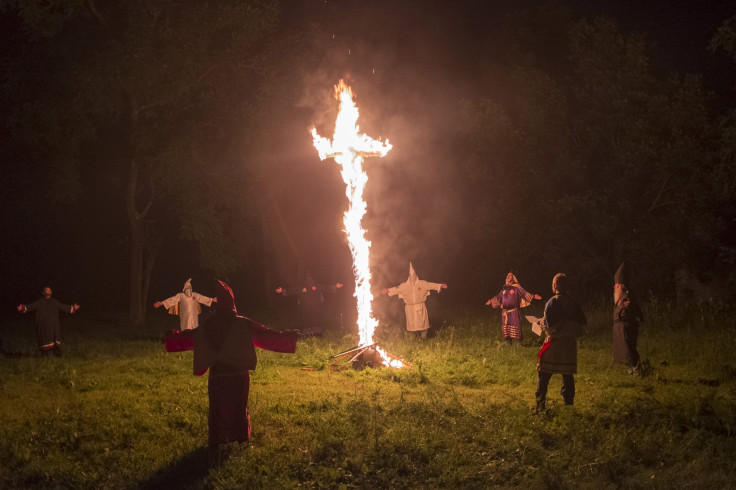Ku Klux Klan Members Explain Why They Love Donald Trump: Recruitment Grows With President's Message

Ending illegal immigration, building a border wall and preventing terrorists from coming into the U.S. are a handful of the points on Ku Klux Klan leader Will Quigg’s checklist for "making America great again." And Quigg, who says the nation was “founded to be free, white and Christian,” feels confident that President Donald Trump's promises to grow the economy and prevent “illegal aliens” from coming into the U.S. are aligned with the KKK’s visions for America.
Quigg, a Grand Dragon and King Keagle of the Loyal White Knights’ West Coast chapter, isn't the only KKK member excited by the prospects of a Trump administration. As a high ranking member of an infamous white supremacist organization, Quigg said he sees everyday how the rhetoric of Trump’s “Make America Great Again” slogan is resonating with people who want to join or who have recently been recruited by the Klan.
“We’ve seen a rise in [Klan] membership in the last two years, well, ever since Trump put in his dollar to get into the race. And especially every time he would say something that was not socially acceptable on a mainstream level,” Quigg told International Business Times in a phone interview.
Trump’s promises about “building a wall” and a “ban on Muslims” has electrified radical ideology of the far-right, giving some prospective Klan members an incentive to join and leaders to recruit. Several Klan figures, like former KKK Grand Wizard David Duke, formally supported Trump during his campaign despite the president’s eventual denouncement of Klan endorsements. The Klan’s increase in membership within the past two years coincided with Trump’s bid for the presidency: the number of groups grew from 72 in 2014 to 190 in 2015.
While the “mainstream” may not have appreciated some of the president’s contentious comments on immigration and terrorism, swing state voters flocked to his campaign, ultimately putting him in the White House. And hate groups took note.
“That just goes to show us that there are white Americans, and even nonwhite Americans, out there that are tired of what is going on in America today,” Quigg said.
Klan recruitment fliers have appeared in communities across the nation in recent months, with messages such as “You can sleep tonight knowing the Klan is awake!” In February 2016, three people were stabbed during a Ku Klux Klan rally in Anaheim, California. In November, a North Carolina KKK branch announced it would hold a parade to celebrate Trump's White House victory.
Robert Jones, of the Royal White Knights in North Carolina, told The Daily Beast the national recruitment drive was designed to offer an alternative voice at a time when Confederate flags are being removed from state houses. “We’re doing this from the East Coast to the West Coast, just to let people know the Klan’s in their community,” said Jones, the grand dragon of the hate group based in Pelham, North Carolina.
The Klan was notorious in U.S. history for its white nationalist ideology and violent attacks, including the lynching of black people. Klan membership peaked in 1920s with nearly 4 million members. These days, there about 8,000 Klansmen across the U.S. and Quigg’s chapter of the Loyal White Knights is one of many KKK branches throughout the country. Lynching and public rallies are no longer the norm.
One of the ways the Klan has recently increased membership was through online recruitment. Whereas in the past groups found members through recruitment drives, signed paperwork is not as important as members adopting the rhetoric of the KKK and their messages, according to Ryan Lenz, a senior writer for the Southern Poverty Law Center, which refers to the Klan as "the most infamous - and oldest - of American hate groups."
Trump’s vows to deport undocumented immigrants and implement a Muslim registry echo similar visions of the Klan, as do his stances on tough policing and racial profiling to combat terrorism, Lenz said. Meanwhile, recent riots in Ferguson, Missouri, and Baltimore over police brutality and the death of black suspects, which Trump denounced, also helped the Klan “reemerge from the shadows and build their organization once again,” Lenz said.
Bradley Jenkins, an imperial wizard with the United Klans of America, said the group's recent outreach targeted “what we used to call the middle class.” A third-generation Klansmen, Jenkins said the UKA, once deemed one of the most violent KKK organizations in the country, is no longer committed to killing black people.
“We all know what the past reads: the past reads violence, the past reads bombs, bullets and bricks. That was a different era,” he told IBT.
These days, people join the Klan not because they are racist or supremacists, but because they want to help other white people, he said.
“You have people out here that join organizations like this only because they have hate in their heart – we don’t tolerate those. We don’t recruit on somebody’s bias, we recruit if they want to help. We don’t consider ourselves supremacists, we consider ourselves separatists,” Jenkins said.
Jenkins is a Trump supporter. He sees the new president as a strong leader for the future of the nation– and the Klan.
“I can’t speak for any other man and especially not the [president] – people are free thinkers,” Jenkins said. “Mr. Trump is a free thinker, he thinks of what is the best for his corporation. Now he’s going to be thinking what is the best for America."
He added: "If there’s anything that has drove people to join a true Klan organization like the UKA, it is the promise of 'America will be great again.'"
© Copyright IBTimes 2025. All rights reserved.






















